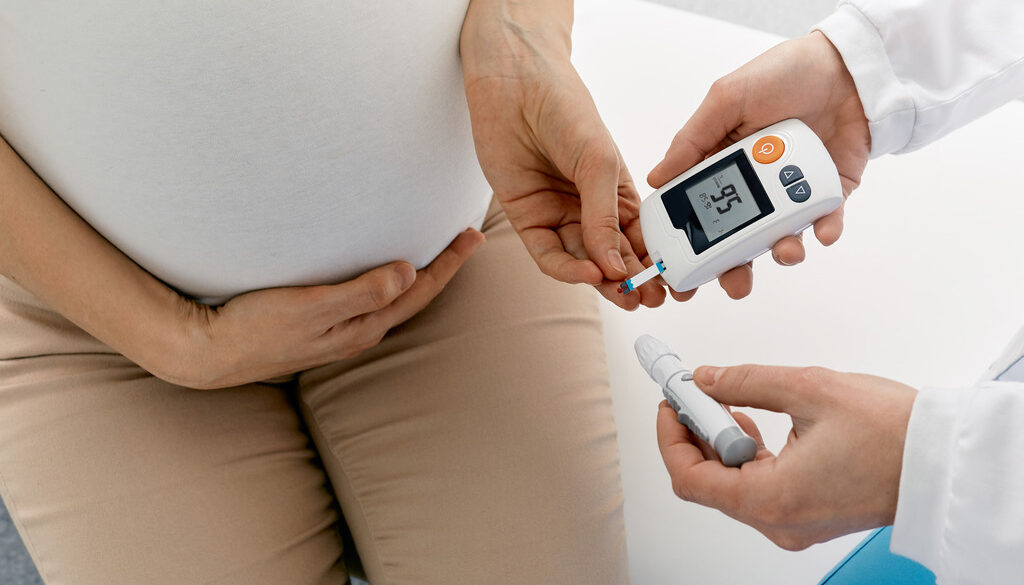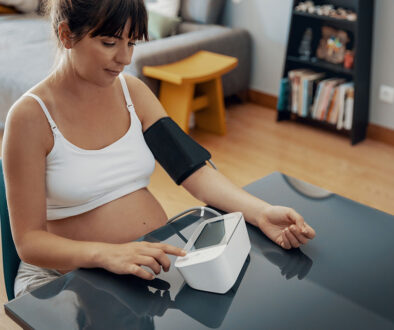A Crash Course on Gestational Diabetes

What is Gestational Diabetes?
Diabetes is a condition in which too much glucose (sugar) remains in the bloodstream instead of being used for energy or stored in the body as energy. Over time, this can cause damage to the eyes, kidneys, nerves, blood vessels, and heart. In pregnancy, gestational diabetes can cause complications for both mom and baby.
What Kind of Complications Can It Cause?
Babies born to moms with gestational diabetes run a higher risk of being large, which can lead to birth trauma, low blood sugar after birth, NICU stays, and even stillbirth.
Moms with gestational diabetes are at risk for high blood pressure, preeclampsia, and labor complications associated with large babies, such as heavy bleeding at delivery, severe perineal tears, and c-section.
What Causes Gestational Diabetes?
Whether you are pregnant or not, when you consume carbohydrates (bread, oatmeal, sweets, etc.), your blood sugar rises. Your body is always trying to keep your blood sugar at a stable level, so when your blood sugar goes up, your pancreas releases insulin to bring it back down. However, people with diabetes have what we call insulin resistance. Their tissues are literally resistant to the action of insulin, so their blood sugar stays high despite their bodies’ best efforts to bring it back down!
Side note: You can have insulin resistance long before you are ever diagnosed with pre-diabetes or diabetes! It’s a whole spectrum.
When you are pregnant, your body is naturally more insulin resistant than at baseline, which is why it’s important to screen for gestational diabetes even if you’ve never had issues with your blood sugar.
How Does the Screening Test for Gestational Diabetes Work?
The 1-hour glucose challenge is the universal screening test for gestational diabetes. It is performed between 24 and 28 weeks of gestation, or earlier if you have certain risk factors. It is done by drinking a sugary beverage (glucola) at a random time during the day and checking your blood sugar one hour later. If your blood sugar is elevated after an hour, it means you need further testing to see if you actually have gestational diabetes.
Those who already have type 1 or type 2 diabetes do not undergo this test.
What If I Don’t Pass My 1-hour Glucose Challenge?
You will be asked to return to the office for the 3-hour glucose tolerance test. It is possible to have an abnormal 1-hour test and a normal 3-hour test.
What If I Have Gestational Diabetes?
If you are diagnosed with gestational diabetes, you will be referred to a specialist to help you manage it. But it’s important for you to know that gestational diabetes can often be controlled with lifestyle changes alone! This includes eating a balanced diet and incorporating exercise into your daily routine. My advice to pregnant patients with gestational diabetes is the same as that for all patients:
- Eat for stable blood sugar. This means making sure that your carbs are always balanced with a healthy source of protein and/or fat. Carbs are not the enemy! They just need friends.
- Example: An apple (carb) is better for your blood sugar with peanut butter (fat/protein) than it is alone.
- Example: Toast (carbs) is better for your blood sugar with an egg (fat/protein) or an avocado (fat) than it is with jam (carbs).
- Exercise at least 5 days a week for 30 minutes. Walking after meals is particularly helpful, as it immediately utilizes that sugar in your veins. Strength training is great.
The silver lining of having gestational diabetes is learning how to manage your lifestyle in ways that are good for you, your growing baby, and your postpartum self. Have questions? Reach out to your OB.
This article was written by Dr. Rebecca Pedersen.




